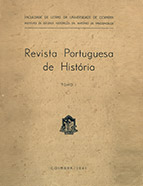

................................
The political change that took place in 1974, coupled with the renewal of RPH's editorial board, part of the Institute of Economic and Social History, provided the conditions for the periodical to effectively fulfil the aims set out in the editorial of the first tome, starting to publish articles on "issues" of interest to history "in its different aspects". The changes were mainly in the opening up to the area of contemporary history and the prevalence of articles from the field of economic and social history. Over the last 4 decades, RPH has tended to publish themed volumes: tome XXIII (1987) published the Proceedings of the Colloquium "The French Revolution and the Iberian Peninsula", XXV was dedicated to the history of Industry, and XXX (1999, but published in 2000) commemorated the 500th anniversary of the arrival of the Portuguese in Brazil ("Portugal and Brazil. Cultural routes").
This trend has become an editorial principle since volume XXXVII, dedicated to "Forms and contexts of violence". In fact, the following tomes were part of thematic dossiers on: "Guerras e conflitos no século XX [Wars and conflicts in the 20th century] " (XXXVIII) ; "Da teoria da História à didática da História [From History theory to History teaching] " (XXXIX); "Religião, religiões e diálogo inter-religioso [Religion, religions and inter-religious dialogue] " (XL); "História Rural [Rural history] " (XLI); "Historiografia portuguesa [Portuguese historiography]" (XLII); "Água: vida, economia e cultura [Water: life, economy and culture]" (XLIII); "The nobility: times, spaces and powers" (XLIV); “ Depois da guerra [After the war] ”, a volume dedicated to war in contemporary times (XLV) and, finally, in the year (2015) that marked the conquest of Ceuta, RPH published studies on “ Presença de Portugal no mundo [Portugal's presence in the world]”.
This work is financed by national funds through FCT - Foundation for Science and Technology, I.P, in the scope of the projects UIDB/04311/2020 and UIDP/04311/2020.
